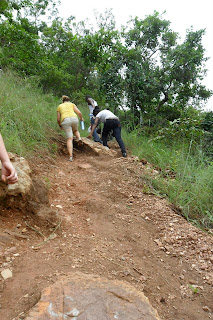Cellphone use has skyrocketed in Ghana over the last decade. Of a population of 24.7million (2011 estimate), there are merely 267,000 (2009) land lines and over 15.109 million (2009) cellphone users that grows each day. I find it very interesting how Ghana, and indeed many African countries, have basically skipped the landline phase and have transitioned smoothly to using cellphones. Even at my office, landline phones are non-existent. I knew based on my pre-departure research that cellphones are considerably cheaper than in Canada (let’s face it - anywhere is cheaper than Canada). The phones themselves start at 20 cedi ($15), and for that you get a simple phone with a flashlight and FM radio. For that little, that’s pretty great value. Phones can range up to 1100 cedi for the brand new BlackBerry Torch, if you are feeling flush with cash. I don’t often see people walking around with BlackBerrys except on campus where I see people with them all the time. iPhones and Android phones are also becoming more popular for those who can afford them. Some people have multiple cellphones. This seems rather excessive however once you experience the unreliability of cellphone networks in Ghana, it makes sense to have multiple phones with different networks in case one network goes down.
There are a few key differences between the Ghanian system and the Canadian one.
Firstly, there are many different service providers in Ghana from MTN, TiGO, AirTel, Vodafone, and the new GLO which has yet to start providing service. Unlike in Canada where you are very limited in your options (Bell, Rogers and Telus being the main three), all of the companies here are independent and switching between networks is no more difficult than either porting your number to the new network or simply buying a new SIM card. Secondly, in Ghana a SIM card will set you back 1 cedi or approx 60 cents CAD. In Canada these tiny little chips can cost upwards of $20. Some people have phones with slots for two SIM cards for different networks which is great because you never know when a particular network is going to be down. Once you have paid for your SIM card, you can start adding credit to your phone by buying the scratch cards being sold pretty much everywhere. Enter the unique number code and you are ready to start using your phone. Unlike in Canada where you pay that silly $7 monthly network fee and that emergency number fee, here whatever money you spend on credit is yours to use.
Data, something I could never afford at home, is completely affordable here. I use Vodafone and I pay for what I use. Most networks require BlackBerry users to pay for a data subscription that is valid for a month. It is really really handy to be able to get online whenever I need to wherever I am. I find my BlackBerry internet the most reliable internet access I have.
Cellphone usage has many headaches in Ghana. It is beyond frustrating when you are trying to make a call and it drops every 30 seconds or simply doesn’t connect. It is equally frustrating when my SMS messages seem to evaporate into thin air, never reaching the recipient. It is puzzling that I get excellent service in my building but if I go to the buildings on either side of mine, I can’t get reception if my life depended on it. There are also days where BBM or the internet just doesn’t work despite my best efforts.
Welcome to Ghana!
To leave a comment, please click on the “0 comments” button below. No account is necessary to leave a comment.
















